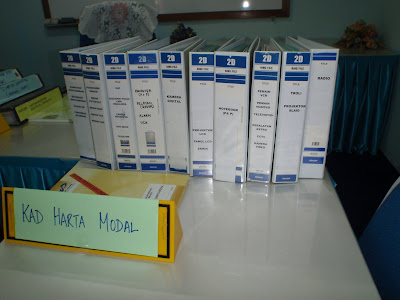There are educators who are good at their job, and there are those who see teaching as a lifelong calling and put in the effort to inspire their charges.
ON HIS blog, Rodney Tan Chai Whatt introduces himself as a progressive English language teacher teaching in a secondary school at the Unesco World Heritage City of Malacca.
Indeed, Tan is one of the “cool” teachers in school who posts revision materials online, and interacts with his students on his English Teachers’ Network blog.
 Spaceman: Tan being strapped to the multi-axis trainer by a facilitator. He had to remove his spectacles and and things from his trouser pocket to prevent the items from floating in the air.
Spaceman: Tan being strapped to the multi-axis trainer by a facilitator. He had to remove his spectacles and and things from his trouser pocket to prevent the items from floating in the air.“A progressive teacher must be willing to try new things and unorthodox methods in the classroom. I always try to read up on the latest research findings on education to find out how I can keep my students interested,” says the SMK Methodist ACS Malacca teacher.
Always striving to improve himself, Tan had applied to join the Honeywell Space Camp for Educators programme in the United States (US) Space and Rocket Centre, Huntsville, Alabama for the past few years.
Third time proved the charm when he was finally accepted into the all-expenses-paid programme last year.
His accomplishment is the pride of his students who are privileged to have a teacher who has stepped inside a space shuttle simulator.
Joining 110 other teachers from 21 countries worldwide, Tan embarked on an experience of a lifetime exploring the Apollo Saturn V rocket and the famous Space Shuttle Atlantis, and even experimented with building water bottle rockets himself.
“I have been fascinated with space since I was a child, but never in my life did I think I would have had a chance to come this close to being in a space shuttle,” says the affable 49-year-old Star Trek fan who plays the guitar occasionally.
Tan was successful in getting accepted into the all-expenses-paid-programme after three previous attempts.
He submitted his application with an essay detailing the problems faced in the classroom, ways he used in overcoming them and how the experience gained at the Space Camp would be incorporated into his lessons.
“Besides marvelling at the exhibits at the US Space and Rocket Centre, the greatest benefit from the experience (camp) was the opportunity to network and exchange views and ideas with educators from across the globe,” says Tan.
Organised by the US Space and Rocket Centre Education Department, the space camp is a professional development programme for teachers with 45 hours of intensive classroom, laboratory and training time focusing on space science and space exploration.
Teachers also participated in astronaut-style training and simulations, as well as activities to promote lifelong learning in a classroom setting.
“The activities make the process of learning enjoyable and meaningful. Science was brought to life through practical projects such as rocket building,” says Tan.
Aimed at motivating students towards learning Science, the activities were centred around problem-solving methods encompassing problem analysis, brainstorming of ideas and testing of the solutions.
Being surrounded by teachers who are passionate about space has turned out to be a very inspiring experience for Tan.
“They are keen to learn and we are like the excitable students during the challenge where teams of teachers compete to build the heat shields that protect spacecraft as it re-enters the earth’s atmosphere,” says Tan.
He commends the effort taken by the US government to promote continuous learning programmes for teachers.
“It is easy to see why the US is so successful in space exploration. Teachers play an important role in inspiring the next generation of astronauts,” he says.
Voicing his concern for the lack of professional development programmes for teachers in Malaysia, Tan supports other teachers to follow in his footsteps and apply for similar programmes.
“I am an English teacher and I was selected for this programme that caters for Maths and Science teachers. I don’t see why other subject teachers should not give it a try,” says Tan.
Now his students have a reason to look forward to his lessons as they get to listen to their teacher recounting his out-of-space experience which includes being spun around by a multi-axis trainer, a machine which simulates the disorientation astronauts feel during re-entry into the earth’s atmosphere.
There is little wonder now that space frequently becomes a theme in comprehension and essay writing for his students.
“It is a pity that there is not enough emphasis on space in our Science subjects in school. Based on what I have observed, we could replicate, adapt and innovate the US space education programme to suit our local context and resources,” says Tan.
“I hope I can motivate my students to literally and metaphorically ‘reach for the stars’,” he says.
Aim for the stars he does, and Tan is beaming with pride that 12 of his students have recently received offers to participate in a space camp programme for students in Turkey.


















































